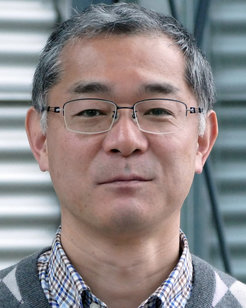2018 Nishina Memorial Prize for Masaru Shibata
Professor Masaru Shibata, director at the Max Planck Institute for Gravitational Physics (Albert Einstein Institute) in Potsdam, receives the most prestigious Japanese physics award
The laudation emphasizes “Dr. Shibata is certainly the pioneer and the front runner in the research of binary neutron star mergers based on numerical relativity simulations. Coupled with expected further advancements in observations of gravitational waves and electromagnetic counterparts, Dr. Shibata’s work will undoubtedly gain increasing importance.” Binary neutron star mergers are interesting astrophysical events not just to verify general relativity involving very strong gravitational fields, but also to provide information on the internal structure of neutron stars and the astrophysical origin of heavy elements such as gold and platinum.

“For more than 20 years my team and I have been exploring relativistic merger events using numerical simulations,” says Masaru Shibata. “I am very happy and greatly honored by this recognition of my work!”
Shibata focuses on theoretical general relativistic astrophysics. He is working on numerical solutions of Einstein’s general relativity theory. For highly complex processes such as merging neutron stars and black holes these non-linear differential equations cannot be solved analytically. Therefore, numerical relativity simulations using high-performance computers are the suitable approach for theoretical studies. Numerical relativity simulations play an important role in predicting accurate gravitational waveforms for the search in the detector data and for exploring high-energy phenomena such as supernova explosions and gamma-ray bursts. In his research career, Shibata founded standard theories on dynamical merger processes, gravitational waveforms, mass ejection and neutrino emission, among others, and has extended theoretical predictions of the behavior of gravitational waves and electromagnetic radiation in binary neutron star mergers.
Masaru Shibata is Director at the Max Planck Institute for Gravitational Physics (Albert Einstein Institute) in Potsdam and Professor at the Yukawa Institute for Theoretical Physics at Kyoto University. He earned his PhD in physics at Kyoto University in Japan. While at Osaka University as an assistant professor (1993 – 2000) he became visiting professor at the University of Illinois at Urbana-Champaign, USA. In 2000 he has been appointed associate professor at the University of Tokyo. He joined the Yukawa Institute for Theoretical Physics at Kyoto University as a full professor in 2009. Shibata is a Fellow of the International Society on General Relativity and Gravitation. He was awarded the Nishinomiya-Yukawa Memorial Prize in 2003 and an Outstanding Paper Award of the Physical Society of Japan in 2008. In 2010, Shibata received one of the Excellent Young Researchers Prizes of the Japan Society for the Promotion of Science.
The Nishina Memorial Prize is the oldest and most prestigious physics award in Japan. It has been awarded annually by the Nishina Memorial Foundation since 1955. The foundation commemorates Yoshio Nishina, the founding father of modern physics research in Japan and mentor of the first two Japanese Nobel Laureates in Physics, Hideki Yukawa and Sin-Itiro Tomonaga.
The Prize, of ¥500,000 (about €4,000) and the certificate, is awarded to scientists who have made substantial contributions in the field of atomic and sub-atomic physics research. Six Nobel Prizes in Physics have been awarded to prior Nishina recipients.











